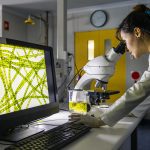U of A looks for professor to work in institute to develop the use of cell cultures to grow food on an industrial scale
Cell cultures are used to grow cells taken from plants or animals, which traditionally has been conducted at a small scale in petri dishes in laboratories. Cellular agriculture aims to expand this process to create a wide range of food products on an industrial scale, including meat.Tag Archives cellular agriculture

New U of A institute to help develop cellular agriculture
An institute being developed at the University of Alberta aims to help kickstart a new high-tech industry to create food from cell cultures rather than farms, said a scientist. The Institute of Cellular Agriculture will likely be launched early in the new year, said Heather Bruce, chair of the university’s department of agricultural food and […] Read more

Cellular agriculture gets a close look
An Alberta project hopes to determine how animal cells can be grown not only for meat, but also for fat and organs
The role of western Canadian farmers in a world where food could increasingly be grown from cell cultures created by scientists is something that everyone needs to think about more deeply, said an expert. “To me at the end of the day, the Canadian Prairies are always going to feed the world,” said Isha Datar, […] Read more



